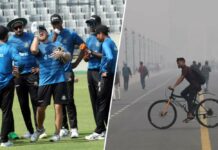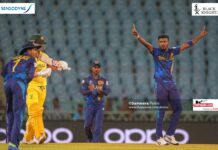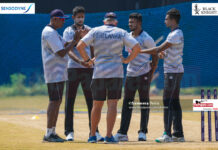After six weeks in New Zealand, which included two Test matches and seven ODIs, the time to scout has passed for Sri Lanka.
They must move quickly past Dhammika Prasad’s injury and hope that Lasith Malinga – who admitted on Sunday that each delivery bowled in the nets hurts – gets match-ready and remains so throughout the 2015 ICC World Cup. Driving their optimism about the teams chances in the tournament were the fabled pair of Mahela Jayawardene and Kumar Sangakkara – 26,218 ODI runs between them – who will bow out of 50-over cricket after the quadrennial event.
In the seven ODIs with New Zealand, Sangakkara (321) and Tillakaratne Dilshan (397) topped the run charts but the lack of support told. The bulk of Jayawardene’s 278 runs came in two innings (104 in Christchurch and 94 in Nelson) and no other batsman made 150 runs. While Sangakkara admitted the lack of runs from the middle order was a factor in defeat, he felt the team was ready to improve come February 14.
“There’s not a huge amount of work to do for us other than understanding what cost us the games against New Zealand,” he said on the eve of Sri Lanka’s first warm-up against South Africa at Hagley Oval. “You have to trust the guys picked. The best players are in your 15 when you play a World Cup. You know their capabilities. The worst thing you can do is start doubting each other, doubting yourself, and we’ve learnt that from our past tournaments and this series as well. Scoring runs and getting beyond the 260s and 270s will be important [in the World Cup].
“New Zealand is our opening game and while that’s great to start the tournament off, we play a lot of varied oppositions so it’s about being flexible. Once the game gets going, you look to two or three of your players to deliver something a bit more than your normal stock, so you can take a game away from the opposition or really hold your own in the crucial moments. So whether it’s having Lasith back or getting our middle order contributing more, making sure we bat long and get good partnerships going, getting through the Powerplays, holding our catches all those basics come into play in a World Cup.”
In skipper Angelo Mathews’ opinion, the difference between Sri Lanka and New Zealand in the recent ODIs was Malinga. The veteran fast bowler has not played competitive cricket since September and remains in doubt for Sri Lanka’s two practice matches before the tournament begins after admitting himself that he is not in a very comfortable space owing to a sore left ankle. While Sri Lanka will hope Malinga is fit for the first game against New Zealand on February 14, Jayawardene believed the team had its focus intact.
“I don’t think it’s just Lasith, it’s about us playing good cricket,” he said. “In the seven-match series, we had some opportunities which we did not capitalise on; it was close in some games but we didn’t finish games off. Those were mistakes made. Lasith coming into the equation gives us that extra bit of an X-factor in the line-up, and the others will feed off him. On the field as well, his ideas as a bowler you saw in the World Twenty20 how he managed that bowling unit in that situation was fantastic. Because of his experience and because of his presence, we get an extra ten percent maybe.”
In Jayawardene’s view, this was the most open World Cup he was a part of. “England’s improved a lot with a younger group, South Africa have come heaps, Australia is a very good opposition, New Zealand has risen up in the last couple of years, India play consistent cricket when it comes to big tournaments, and Pakistan’s got some good talent coming through. So when you see all that, it’s a great competition. This is what a World Cup should be,” he said.
“You cannot take anything for granted. Every game is crucial. Getting momentum, getting game-plans and execution right is important. The group stage, even though people think it’s not important, is important. The first hurdle is that. From that stage onwards, it’s about how you handle that day’s pressure, how you execute your game-plan. That’s when the favourites [tag] and all that goes away. That is the challenge that all the top teams face.”
Sangakkara, who like Jayawardene has appeared in two World Cup finals without tasting title success, also reckoned this was a competitive tournament. “Most of the sides are pretty well balanced,” he said. “Everyone will have a competitive edge. Especially with the elimination format for the second round, the key will be getting into the quarters and then it’s whoever wins goes through, so anyone playing in that context will fancy themselves to be able to beat any side on the day.”
The structure of this World Cup is tailored to allow the better sides to progress to the quarter-finals, considering that you can lose two matches and still make it. While the format has its critics, according to Sangakkara this made for a more exciting tournament.
“You play within the constraints of the format,” he said. “In 2007 we played a round-robin competition which was quite long, but consistency paid off to a large extent. You play in the Super Sixes and the most consistent sides go through, carry points through and all that. Here, no matter what you do in the first round, you have an equal chance of going through to the semis as long as you win. It’s a bit more exciting. And it rewards teams that are able to raise their games. I think for the spectators and the cricketers, this is is more exciting. And it makes the tournament shorter, more compact. I’m pretty happy with it.”
After ending up losing finalists in 2007 and 2011, Jayawardene felt that Sri Lanka know what it takes to reach the summit – especially considering that several players from the previous edition form the bulk of the current World Cup squad. “We have to take the positives from what we’ve done in those two World Cups,” he said. “The preparations, the tactics, and how we approach certain things will all come into play because we’ve gone long distances before. That will definitely help us. Even in the last Twenty20 World Cup, some of the younger guys tasted how sweet it is to win something big, so all that we will carry on and make sure this will be a memorable one for all of us.”
Jayawardene and Sangakkara’s last appearance in T20I cricket resulted in Sri Lanka finally lifting the ICC World Twenty20, so how sweet would a 50-over World Cup title be as a signing off point from international cricket?
“It would be great,” said Jayawardene, “but I’m not thinking about that finish line right now. It’s about getting everything right, one step at a time. Everybody wants to win the World Cup and I had the same dream in my last World Cups.”





















